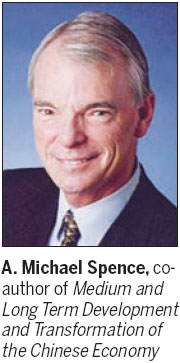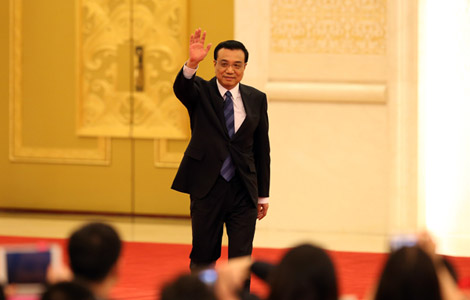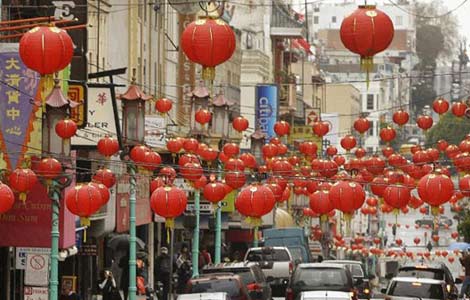Nobel laureate: Beijing reform policies 'dynamic and flexible'
Updated: 2014-03-13 12:56
By Zhang Yuwei in New York (China Daily USA)
|
||||||||
China's economic growth target of 7.5 percent and reform policies set out at the annual meetings of the National People's Congress and the Chinese People's Political Consultative Conference, or the Two Sessions, have shown that China is on the track of being a "dynamic and flexible" economy, said a Nobel laureate.
A. Michael Spence, who was awarded the Nobel Prize for economics in 2001 and chaired the World Bank's Commission on Growth and Development, said the growth target mentioned in Chinese Premier Li Keqiang's government work report during the two sessions was a "reasonable" goal.
"This figure seems a very reasonable estimate and goal for growth this year, provided there isn't some major crisis outside - somewhere in the global economy or financial system," said Spence.
Spence, co-author of Medium and Long Term Development and Transformation of the Chinese Economy, has become more of an expert on the world's No 2 economy in recent years. He and the book's co-author, Edwin Lim, a former World Bank representative in China who set up the bank's Beijing office in 1985, have been invited by Beijing to advise on economic issues in China.
"My impression - as an outsider - is that the changing growth pattern in China is going well and that the present government has an ambitious reform program that will support the structural changes," said Spence. "I think the Chinese economy is very dynamic and flexible."
The annual two sessions are where the Chinese government discusses and sets the agenda for the coming year. The discussions have attracted attention from both home and abroad.

This year's key policy objectives include boosting domestic demand, maintaining rural development, enhancing environmental protection, among others.
"These are all major components of the changing growth pattern and reform agenda," said the Nobel economist, who teaches at New York University's Stern Business School.
On the economic front, the government will reform its science and technology management system to encourage businesses to play a more "active" role in technological innovation. The reform agenda includes establishing more science parks in the national innovation demonstration zone, where incentives are provided for making innovations. In addition, the government will increase spending on "cutting-edge" technologies.
"Business and government both have important but different roles to play in science and technology management and innovation," said Spence, who received the 2001 Nobel Memorial Prize in Economic Science along with George Akerlof and Joseph Stiglitz, for their work on the dynamics of information flows and market development.
"This is already becoming an important element of Chinese growth now and its importance will increase In the future," Spence added.
Spence believes that reforms set out by the Chinese government under the new leadership will "lessen incentives or opportunities to push investment into low return territory so that capital will be allocated more by market determined prices, outcomes and innovation."
"China is making these important transitions in a global economy that is still out of balance and struggling with growth," he said.
Even though that may be harder to do so in the current global economic environment, Spence is positive about all the efforts coming out of the world's No 2 economy.
"Notwithstanding that, I am optimistic about the growth prospects and the success of the economic and social and environment agendas," he said.
yuweizhang@chinadailyusa.com
(China Daily USA 03/13/2014 page2)

 US Black Sea naval drills start near Crimea
US Black Sea naval drills start near Crimea
 Cooperation at the heart of win-win, Li tells world
Cooperation at the heart of win-win, Li tells world
 Prayers for missing flight MH370
Prayers for missing flight MH370
 US first lady promotes film
US first lady promotes film
 Who's got the No 1 Chinatown in the US?
Who's got the No 1 Chinatown in the US?
 Obama sweats over sweaters during shopping
Obama sweats over sweaters during shopping
 Chinese arcade games on display
Chinese arcade games on display
 Photos of stolen passport holders released
Photos of stolen passport holders released
Most Viewed
Editor's Picks

|

|

|

|

|

|
Today's Top News
China, US 'should stress' mutual interests
Search for MH370 may expand to Indian Ocean
US warns Russia of 'serious' steps
Feinstein gives a wake-up on spying
Satellite images not of MH370 crash: officials
Nevada woos Chinese investment
China defends South China Sea action
Nobel laureate: Beijing reform policies 'dynamic and flexible'
US Weekly

|

|







